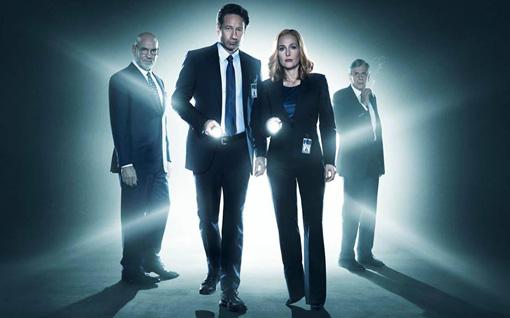
Like it or not, we’re living in the age of the comeback, on small and silver screen alike. And if relatively newer shows like Heroes, 24, and Prison Break can return, you can bet that television networks are going to do their utmost to breathe new life into a sci-fi cultural gem from the 90s. The question is whether The X-Files, in its six-episode “event series,” lives up to the hype, or holds a candle to the original. For the most part, it does. And while this revival is far from necessary, I must admit that it’s a highly welcome one.
This year’s plot lays out a new alien theory: one in which the U.S. government seems to be using technology long since abandoned by the extraterrestrials. And what are they using that tech for? Experimentation, population control, weather control, even eugenics. The military-industrial complex seems to be the real culprit this time around, and during the premiere episode, Mulder (David Duchovny) realizes that zero-point energy has been a viable resource that has existed for decades, but which has been suppressed by the government in favor of the ever-prominent beating of the oil drum. The writers weave a tapestry of post-alien science fiction, story elements based on kernels of truth, and a plethora of conspiracy theories in varying shades of crazy.
This, in part, is how The X-Files seems to have gained heightened relevance in the current cultural and sociopolitical climate, and the show indeed has new things to say in relation to that altered landscape. In many ways, we live in a time where paranoia is perhaps at an all-time high, privacy concerns and the freedom of information are hot topics, and an ever-festering cynicism toward everyday American life seems to have a hold on my generation.
The X-Files manages to capture all of that and mold it into a backdrop for a compelling new myth arc. It mostly feels like a natural evolution of where the show was back in the 90s, but the first two episodes were not without some ham-fisted dialogue and references (“Edward Snowden,” “9/11”) that felt a little contrived. This approach ultimately feels appropriate enough; but what it means for the hardcore fans of the show, I can’t yet say. Suggesting that the alien conspiracy nine seasons in the making was, after all, a (mostly) human conspiracy all along, is at once both a risky and intriguing gamble.
This, of course, does not mean that all things involving little green men are out the window. Aliens are still involved somehow, it just seems that they’re not so much the enemy as the – albeit inadvertent – facilitators of government world domination. And we’re still going to get episodes that follow the monster-of-the-week format, in which Mulder and Scully (Gillian Anderson) deal with various strange phenomena – often non-alien. From the previews, it seems like next week’s episode, “Mulder and Scully Meet the Were-Monster,” involves exactly what the title suggests.
Speaking now from a more personal perspective, I’ve really enjoyed the first two episodes of this revival. It seems like the show has managed to, thematically speaking, “grow up” and move out of the 90s, but it also doesn’t throw the baby out with the bathwater. The characters have not necessarily evolved, they’ve just sort of adapted to the changing times; Mulder uses a laptop to browse conspiracy websites now, and he and Scully still have their meetings with FBI assistant director Skinner (Mitch Pileggi) – except that now they’re conducted under the scrutinizing noses of the U.S. Department of Defense.
The series premiere was a little slow-paced, but that was necessary, and didn’t bother me at all. However, for those who might not have liked that, the follow-up episode started to really get things moving, despite being a mostly self-contained episode. So far the show has maintained its subtle humor, Duchovny and Anderson have the same great chemistry as always, and the series seems ever so slightly edgier and grittier. I do have to say that so far, though, the series is still finding its footing in terms of the tone and feel of things; parts of these episodes felt a little too polished and clinical – almost like a police procedural. Back in the day, the plot wended its way through a smokescreen of dark, amorphous mystery, and I think that is what really pulls viewers in and keeps them interested. Hopefully the show is working its way back toward that kind of atmosphere.
But, of course, it would be disingenuous if The X-Files sought to completely imitate its previous formula. So many recent “comeback” shows have fallen rather flat because they attempted to replicate the recipes that led to their original success. I think, after seeing two episodes, that The X-Files‘ greatest strength going forward is that it acknowledges the inevitable nostalgia that its audience will feel, but chooses not to wallow in it. Instead, it opts to take the best parts of its predecessor and translate them in a new way for a new generation of viewers. That allows for plenty of creativity, and I look forward to seeing where the remaining four episodes take us.
Photo: The X-Files Facebook page









Comments